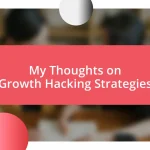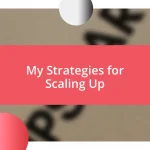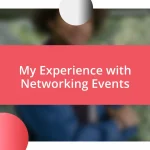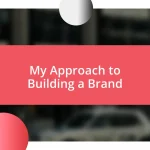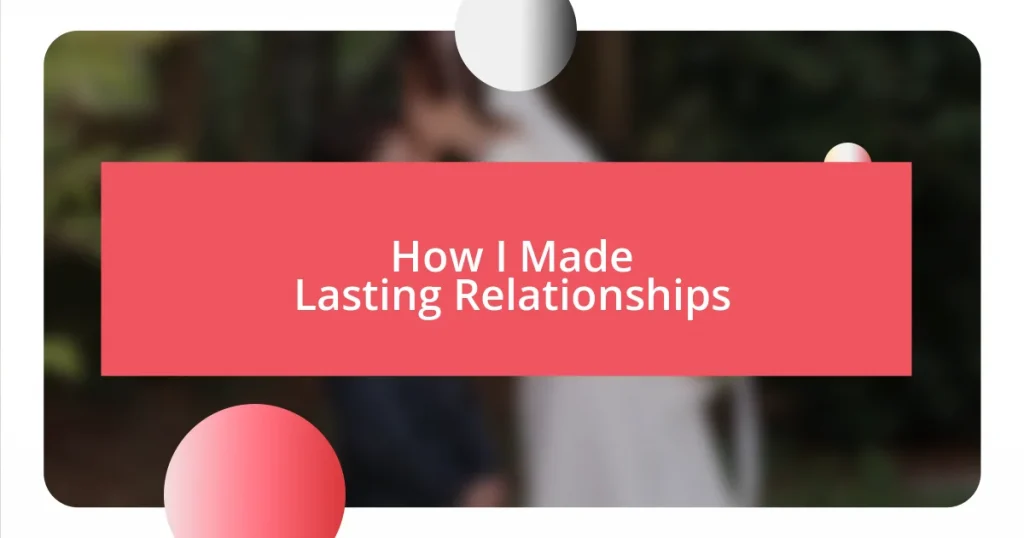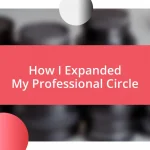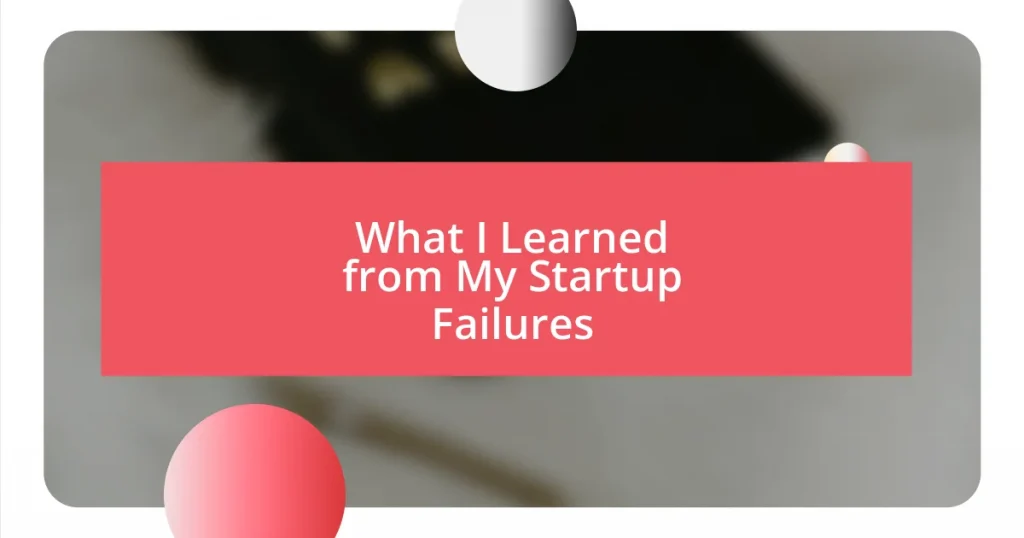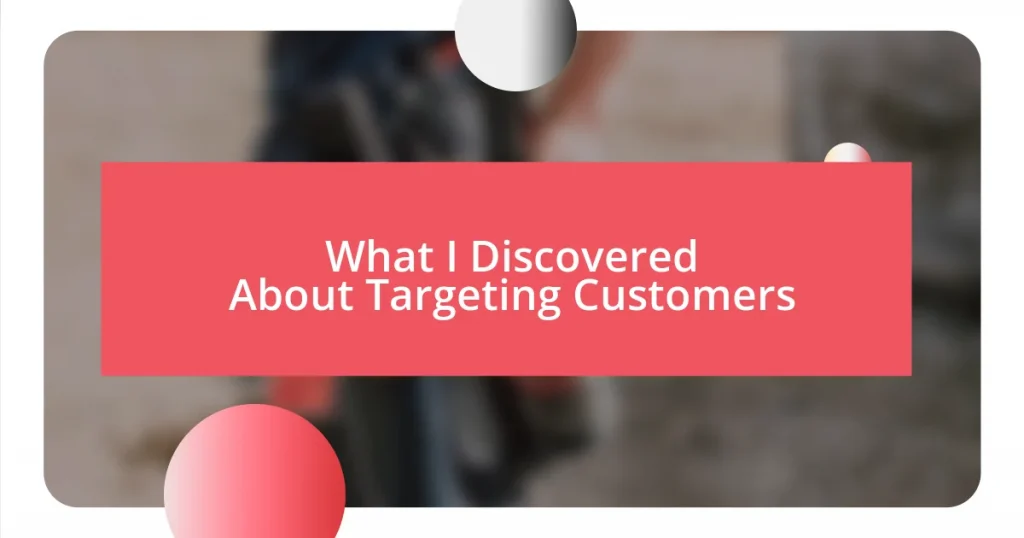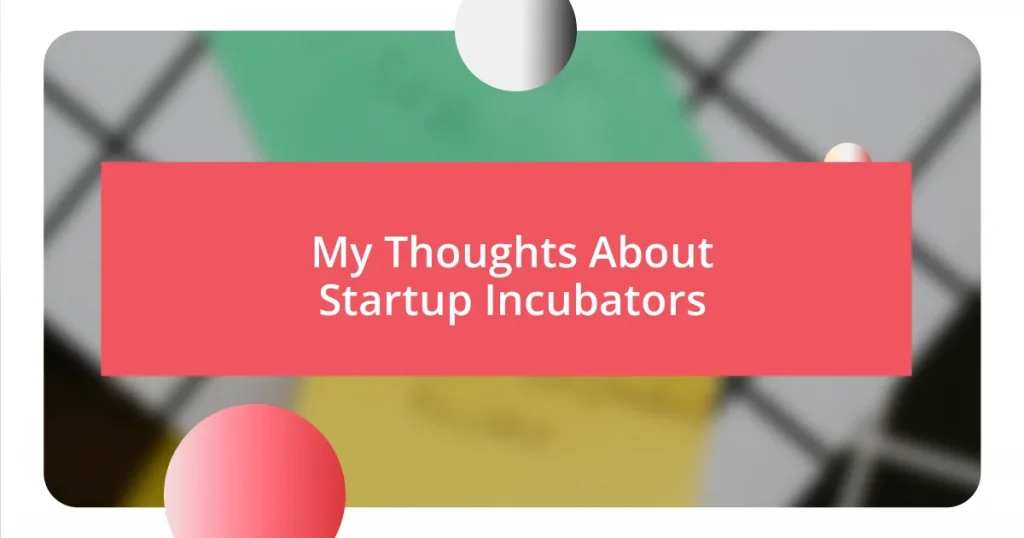Key takeaways:
- Relationships are vital for emotional well-being and health, providing support and a sense of belonging.
- Building trust through consistency, transparency, and active listening is essential for lasting connections.
- Handling conflicts constructively by focusing on solutions and expressing vulnerability strengthens relationships and fosters growth.
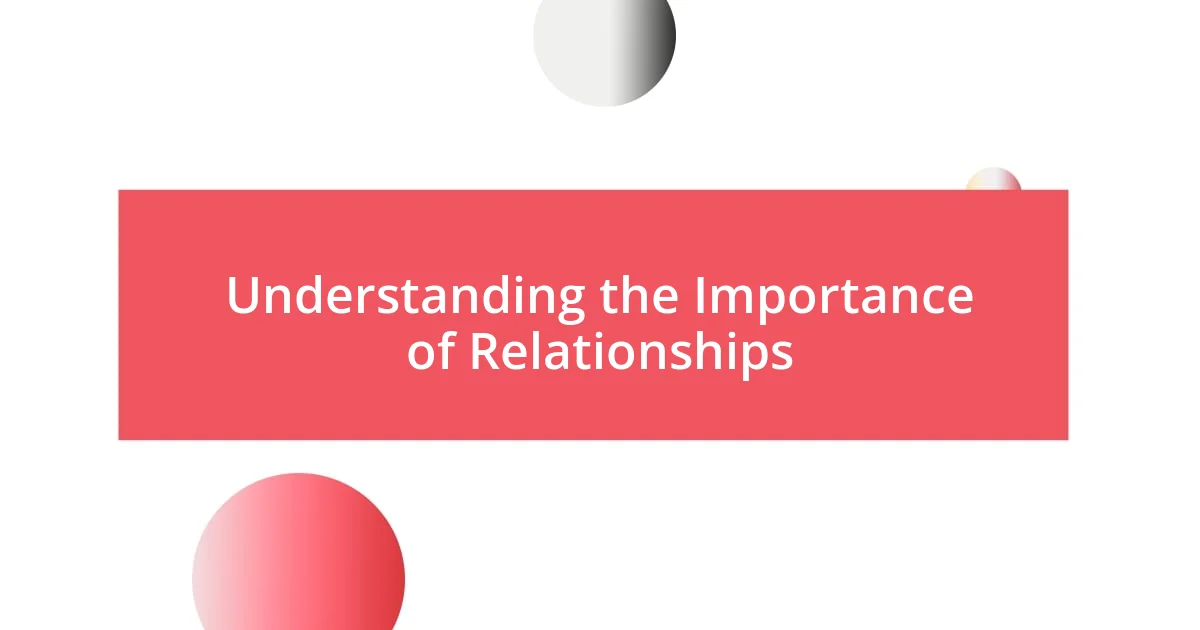
Understanding the Importance of Relationships
Relationships are the foundation of our emotional well-being. I vividly remember my first close friendship in high school; it felt like finding a missing piece of myself. They offer support, joy, and a sense of belonging that is hard to replicate elsewhere. When I reflect on my life’s challenges, it’s often those bonds that helped me navigate through the storms.
Have you ever noticed how good relationships can lift your spirits? I recall a particularly tough week when a friend called just to check in on me. That simple gesture turned my whole week around. It’s amazing how those connections can infuse light into our lives, often in ways we might not expect. They remind us that we are never truly alone, even when days get dark.
The importance of relationships goes beyond just emotional support; they also contribute significantly to our health. Research shows that strong social connections can lead to a longer, healthier life. I’ve seen this firsthand as I’ve forged deeper connections over the years—friends who share not only laughter but also accountability when it comes to our health goals. Isn’t it comforting to think that nurturing these bonds can positively impact our longevity?
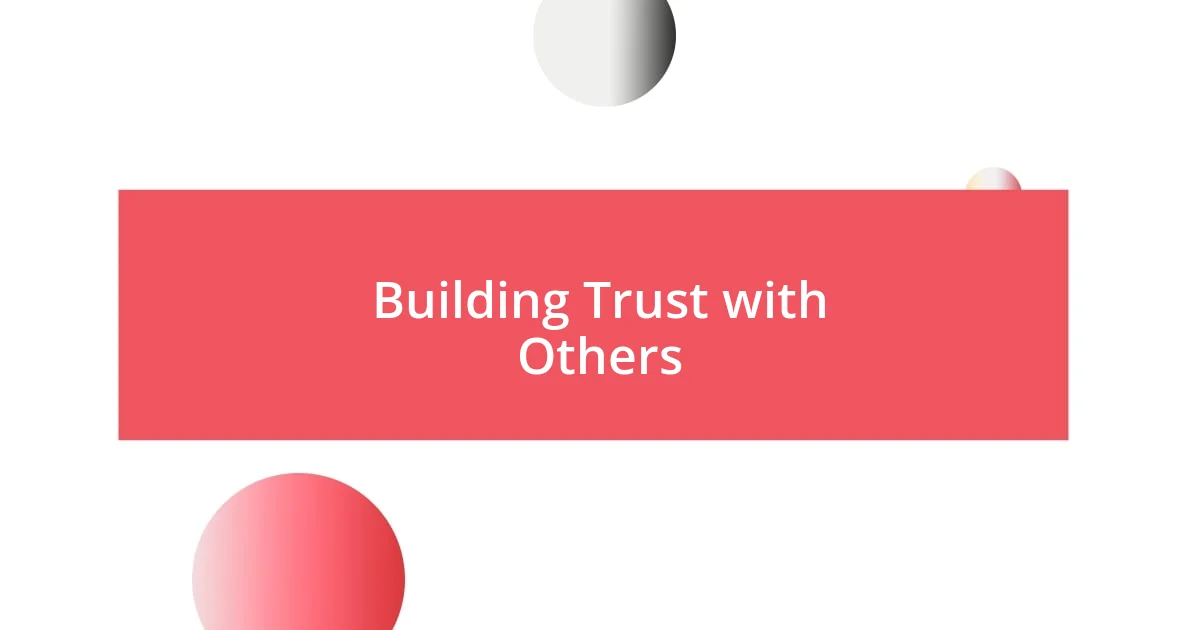
Building Trust with Others
Building trust is the cornerstone of any lasting relationship, and it’s something I’ve learned over time through both successes and mistakes. One specific moment that stands out was a time when I hesitated to share a personal challenge with a close friend. Eventually, I took the plunge and opened up, and their immediate understanding and support made me realize that vulnerability nurtures trust. It’s a two-way street; when you show your true self, it invites others to do the same.
To foster trust, consider these key practices:
- Be Consistent: Trust builds when you follow through on your promises. If I say I’ll be there, I make it a priority.
- Practice Transparency: Sharing your thoughts and feelings can feel risky, but it often brings others closer. I’ve found that being open about my struggles has deepened my connections.
- Listen Actively: Sometimes I remind myself that listening is just as important as speaking. When I’m fully present in a conversation, it shows that I genuinely care.
- Respect Boundaries: Trust flourishes when people feel safe. I always try to honor the limits others set for themselves.
- Admit Mistakes: Nobody’s perfect. When I mess up, acknowledging it and apologizing can surprisingly strengthen my relationships.
Building trust is not just an act; it’s a commitment to creating a safe space where both parties can thrive.
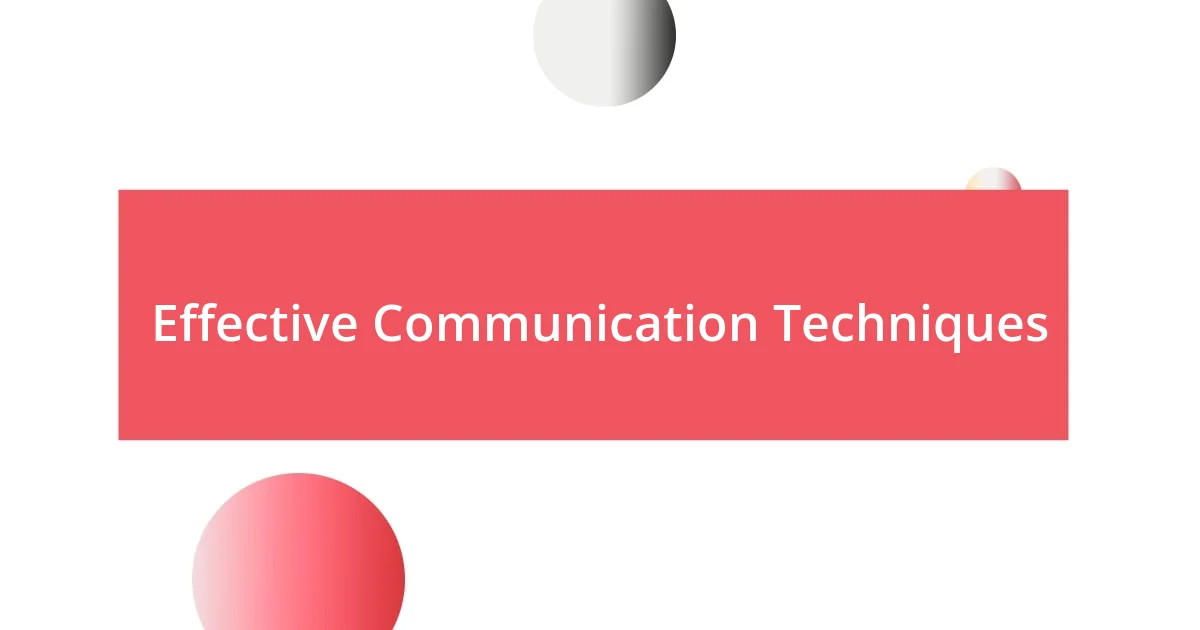
Effective Communication Techniques
Effective communication has been a game changer in my relationships. I’ve found that active listening truly transforms interactions. When I engage in conversations without distractions, I often hear nuances that I might otherwise miss. I remember a time when a friend was sharing about a tough family situation. By putting my phone down and really focusing on them, I was able to provide the support they needed. The relief on their face spoke volumes about how being present can deepen connections.
Another vital technique is asking open-ended questions. It encourages deeper dialogue. For instance, instead of asking “Did you have a good day?” I might say, “What was the highlight of your day?” This simple shift invites a richer conversation and makes the other person feel valued. I’ve noticed that when I ask questions that require more than a yes or no, it fosters a sense of intimacy and engagement.
To enhance communication further, I often reflect on using “I” statements instead of “you” statements. This approach helps me express feelings without sounding accusatory. For example, I might say, “I feel overwhelmed when plans change last minute” rather than “You always change plans.” When I’ve used this technique, I’ve found that it invites empathy instead of defensiveness, allowing for more open and constructive discussions.
| Technique | Description |
|---|---|
| Active Listening | Giving full attention to the speaker, which fosters understanding and connection. |
| Open-Ended Questions | Encouraging deeper dialogue by asking questions that require more than a yes or no response. |
| “I” Statements | Expressing feelings without sounding accusatory, promoting empathy in conversations. |
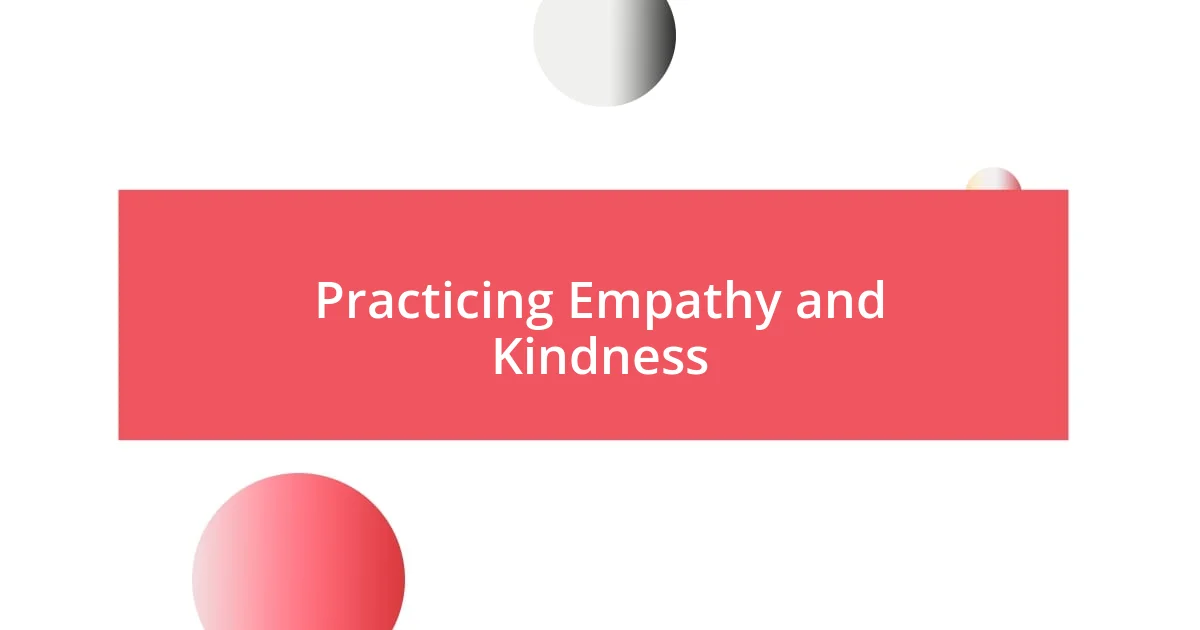
Practicing Empathy and Kindness
Empathy and kindness often go hand in hand, and I’ve found that practicing them can profoundly change the dynamics of my relationships. Last year, I vividly remember a challenging moment when a colleague was overwhelmed with work stress. Instead of simply offering a generic “let me know if you need help,” I took a moment to sit down with them, asking specifically what they were going through. As they opened up about their struggles, I felt my heart reacting—not only was I listening, but I was genuinely connecting. Isn’t it amazing how a sincere question can invite someone to share their worries?
In another instance, I recall attending a friend’s performance, someone I had cheered on through countless rehearsals. As I watched her pour her heart into that stage, I felt compelled to express my appreciation. After the show, I didn’t just say “great job”; I spoke about the emotions her performance evoked in me. The look of surprise and joy on her face reminded me how acts of kindness—with words as simple as “you moved me” or “I admire your courage”—can solidify connections. It made me wonder: have you ever truly acknowledged someone’s effort in this way? It’s a small act that can make a world of difference.
Moreover, I strive to practice self-empathy as well. There are days when I’m hard on myself for not meeting my own expectations, and I’ve learned to pause and treat myself with the same kindness I would offer a friend. This self-compassion not only uplifts my spirit but also enhances how I interact with others. When I’m kinder to myself, I radiate that energy outward. It’s a cycle; the more empathy I show to myself, the more I have to give. How do you practice kindness in your daily life?
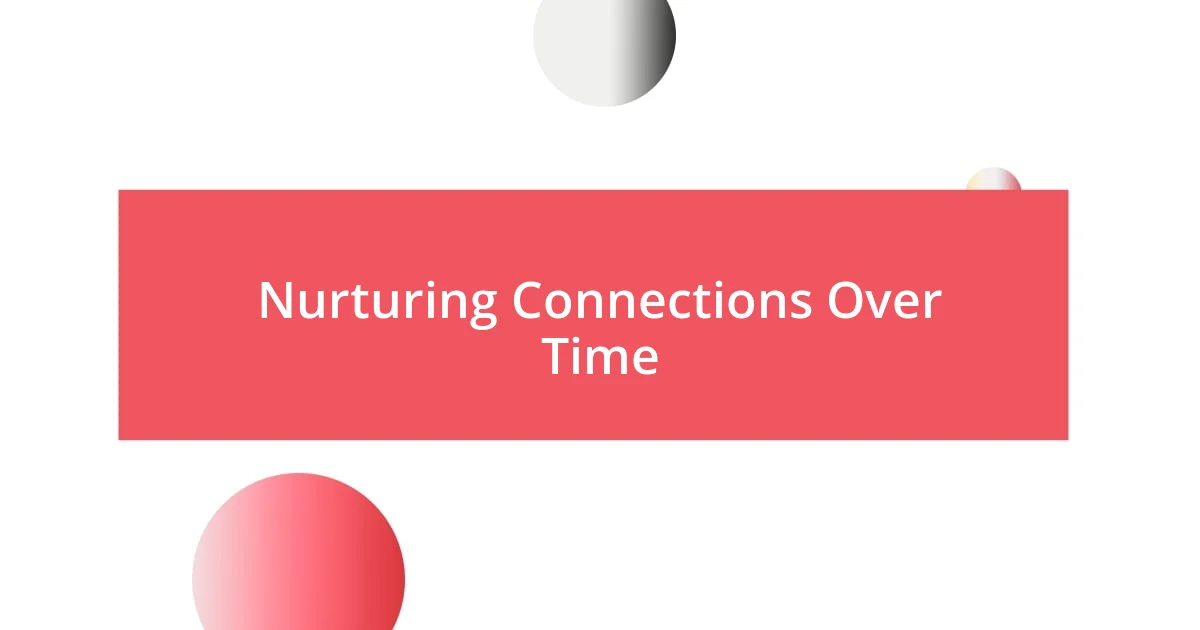
Nurturing Connections Over Time
Nurturing connections over time requires intentional effort and genuine interest. I remember a period when life got busier, making it easy to let friendships slip. Instead of waiting for others to reach out, I took the initiative to schedule regular catch-ups, whether it was a coffee or a simple video call. Each time, I felt like I was watering a plant that had been slightly neglected. It’s fascinating how a little commitment can revitalize relationships, isn’t it?
I’ve also learned the value of celebrating milestones, big or small. For example, when a friend achieved a personal goal, I made it a point to surprise them with a thoughtful gift that reflected their journey. This gesture might seem small, but the joy on their face told me that it mattered. These acts of appreciation reinforce the bond we share and remind us both that we are part of each other’s journeys. Have you ever thought about how recognizing others’ achievements can strengthen your relationship?
Moreover, I’ve discovered that checking in regularly can make a significant difference in my relationships. One time, I shot a quick text to a friend who had been going through a rough patch. Just a simple, “Hey, I was thinking about you today—how are you doing?” can ignite meaningful conversations. Establishing this kind of routine not only nurtures my connections, but it also creates an atmosphere of openness—a space where both parties feel valued and heard. Don’t you think being proactive in your friendships could lead to deeper connections?
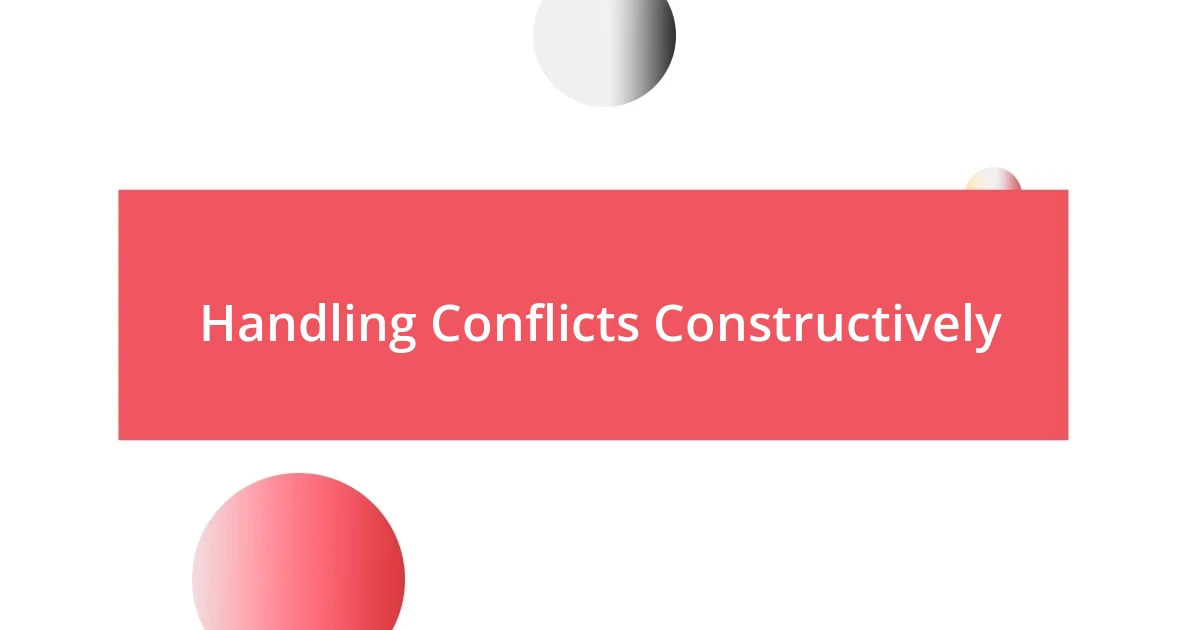
Handling Conflicts Constructively
Handling conflicts is a natural part of any relationship, but how we approach these situations can really affect our connections. I remember a time when a misunderstanding arose between my partner and me over something trivial, but it quickly turned into a heated argument. Instead of escalating the tension, I took a moment to breathe and then invited my partner to share their feelings first. This simple act of listening opened the door to a calmer discussion, which made it clear we both just wanted to be understood. Have you ever found that taking a step back can shift the energy of a disagreement?
When navigating conflicts, I’ve discovered that expressing vulnerability can be incredibly powerful. I once had a disagreement with a close friend about a project we were working on together. Instead of pointing fingers, I shared my worries about how my actions might have contributed to the tension. This honesty not only eased the situation but fostered a deeper understanding between us. It made me realize that showing our true selves in moments of conflict can often bring people closer, don’t you think?
Another crucial aspect I’ve learned is to focus on finding solutions rather than winning arguments. During a tense discussion with a family member, our initial energies were defensive. But then, I proposed we brainstorm together about how to address the issue instead of getting caught up in who was right or wrong. That small shift transformed our approach, allowing us to unite in seeking a way forward. It was rewarding to leave that conversation feeling like allies instead of opponents. How do you usually approach resolving conflicts—do you seek collaboration, or do you find yourself focusing on the disagreement?
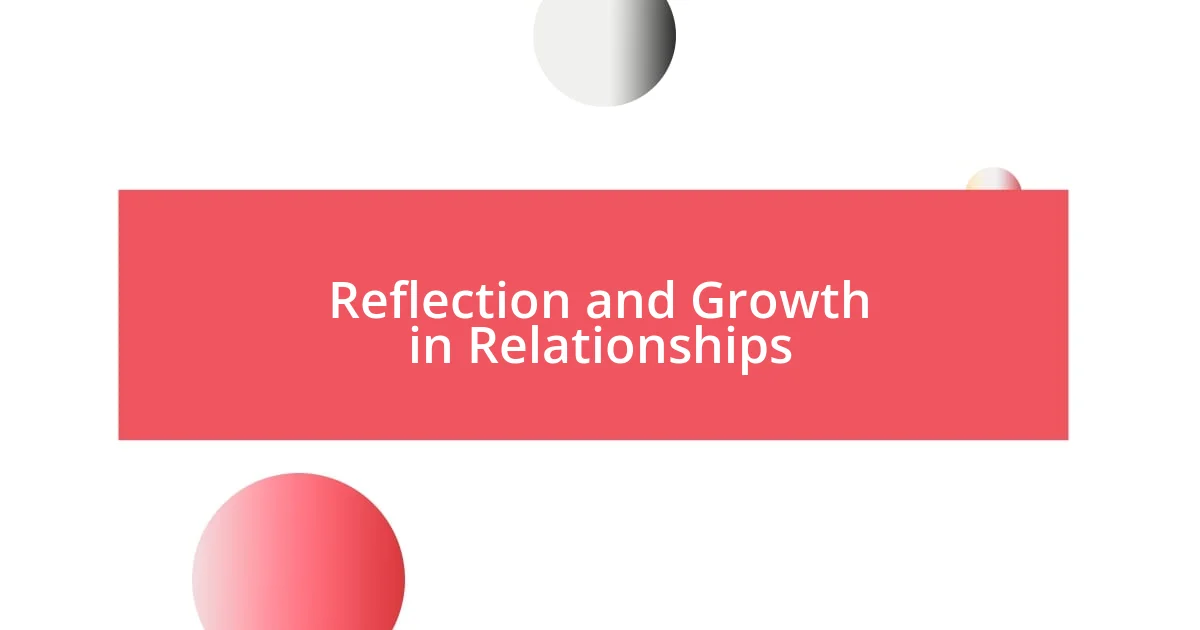
Reflection and Growth in Relationships
Reflecting on my past relationships has been a powerful tool for growth. There was a friendship that once felt strained due to unspoken expectations, and taking time to think about what truly mattered to me changed everything. I reached out to my friend with a heartfelt message, admitting my need for clarity. This simple act of openness led to an honest discussion that revitalized our bond. It made me wonder, how often do we miss the chance to understand each other because we’re too busy expecting things to happen?
As I engaged in this reflective process, I began to recognize patterns in my interactions. I noticed how my reactions sometimes stemmed from past experiences rather than the present moment. For instance, I realized I was often overly defensive in group settings, tied to feelings of insecurity I hadn’t confronted. Acknowledging this allowed me to approach conversations differently, fostering a more open and accepting atmosphere. Have you ever caught yourself reacting in ways that don’t align with the current situation? It’s eye-opening when you connect those dots, isn’t it?
Growth in relationships isn’t just about recognizing our shortcomings; it’s also about celebrating progress together. I remember a time when my partner and I decided to share our individual goals with each other. As we provided encouragement and checked in on our tasks, it felt like we were both elevating our journeys side by side. Reflecting on those shared moments has intensified our commitment, reminding me that when we celebrate growth together, it forms a deeper bond. How can you implement a supportive system in your relationships to foster mutual growth?



